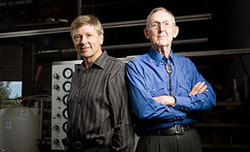Google has announced its first announcements in its RE<C (renewables costing less than coal) initiative and they look pretty cagey.
Google is looking at long-term technologies in niches others don’t consider obvious. It’s also not splashing the cash around. There’s just $10 million in this announcement for:
- Altarock Energy, which is getting $6.25 million, and
- Potter Drilling, which is getting $4 million.
There’s also a research grant of just under $500,000 to SMU’s Geothermal Lab.
All these investments have a theme, specifically Enhanced Geothermal Systems (EGS). Current geothermal plants drill a hole in the Earth to find a source of heat, then pump in water to create steam, and generate electricity from the heat.
This is fine in parts of the West, where there are ample quantities of hot rocks relatively near the surface. Assuming there’s water nearby. It doesn’t work in the East, where rock formations are more stable, meaning you have to drill further to reach the heat source.
The idea of EGS is to solve these problems, pulling heat economically either from deep inside the Earth or from areas where there is no ready supply of water to produce steam.
Altarock, which is based in Seattle and was called "secretive" in a 2007 news story, when it was seeking $4 million, plans to pump water into hot rock formations, then pump the water back up separately. As it rises and its pressure decreases the hot water produces steam for turbines.
Altarock’s "big name" is Susan Petty (above), a geothermal consultant with three decades’ experience at Black Mountain Technologies. It’s as important to get good people in these start-ups as it is good ideas, and Susan is said to be one of the best.
Potter Drilling has what it calls a patented technology, hydrothermal spallation, which uses hydroxinated water (water with simple hydroxides
in it) to dissolve rock. While Altarock was going for a first financing
round last year, this is Potter’s first round.
Co-founders Bob and Jared Potter
are father and son, but it’s Bob who is the inventor here, having
developed the "dry hot rock" technology, the basis of EGS, back in the
1970s. (I really like this picture, which shows Bob’s personality at a glance. Skinny as a rail, tough as nails, disciplined as hell.)
So for about $11 million Google has guaranteed the futures of some
of the biggest names in one of the most promising, but least hyped,
areas of alternative energy.
Sweet.













i did not know that google made investments like this. Good for google to help the country. They are worth a lot of money and they can invest.
i did not know that google made investments like this. Good for google to help the country. They are worth a lot of money and they can invest.